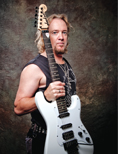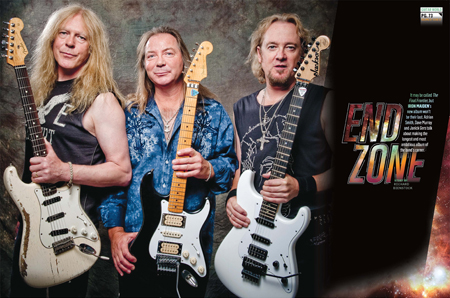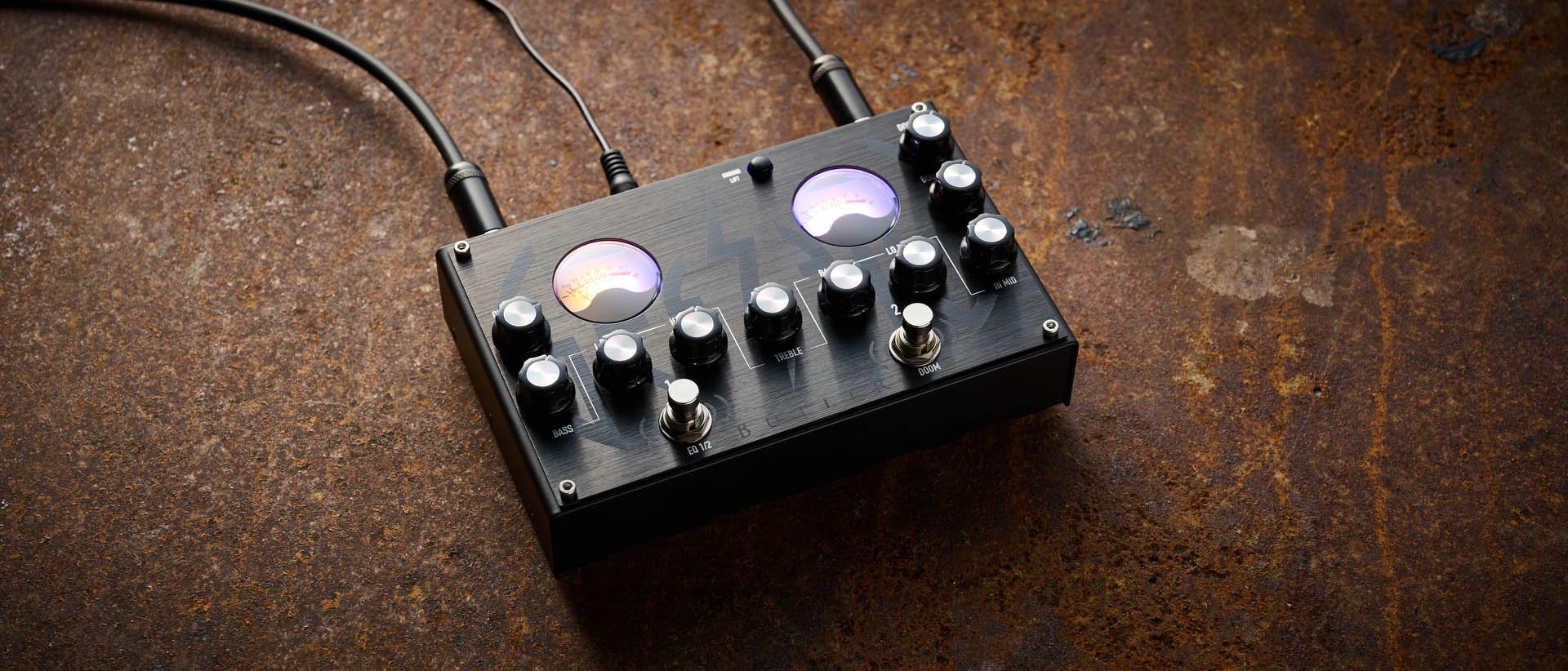Iron Maiden Guitarists Discuss 'The Final Frontier'


Originally published in Guitar World, December 2010
It may be called The Final Frontier, but Iron Maiden's new album
won't be their last. Adrian Smith, Dave Murray and Janick Gers talk about making the longest and most ambitious album of the band's career.
"In Iron Maiden, we’re always pushing the boundaries,” says Dave Murray. And indeed, the British metal legends continue to chart new musical territory on The Final Frontier, their 15th studio album and fourth to feature the distinctive triple-guitar attack of Adrian Smith, Janick Gers and Murray.
According to Gers, that is exactly as it should be. “If you listen to each of our albums, they all sound like Maiden,” he says, “but they’re all still a bit different from one another: Killers doesn’t sound like Brave New World; Seventh Son of a Seventh Son doesn’t sound like The X Factor. Each one is a statement of where the band was at a particular time. And that’s all an album is—a snapshot. You go into the studio and you gather all the things you’ve seen and done over the past year or so and you regurgitate them in music. If you’re doing that successfully, you’re not looking back and trying to recreate the past, you’re documenting the present and also contributing to the future.”
It is this mindset that has enabled Iron Maiden to continue to be a creative and exciting musical force. So much so that The Final Frontier is not only their longest—and arguably most progressive—effort to date, spreading 10 songs across a whopping 76 minutes of music, but also among their most diverse. Take the album’s lead-off track, “Satellite 15…The Final Frontier,” which opens with several minutes of spacey, impressionistic sonic clutter before abruptly shifting gears to a straight-up, four-on-the-floor-style hard rocker. From there, the band—which in addition to the three guitarists also includes singer Bruce Dickinson, drummer Nicko McBrain and founding bassist Steve Harris—churns out everything from growling riff-rockers (“El Dorado”) to soaring ballads (“Coming Home”) to trademark, harmony-guitar-infused metal cuts (“The Alchemist”). There are also, of course, plenty of intricately arranged proggy workouts, including the 10-minute-plus closer, “When the Wild Wind Blows,” among the longest and most complex songs in the band’s extensive canon.
Guitar World recently sat down with Smith and Gers to discuss the making of The Final Frontier as well as talk about how the musicians approach writing, recording and performing in a three-guitar context. The two also ruminated on how it is that, 30 years after the release of the band’s self-titled debut, Iron Maiden continue to remain at the forefront of heavy metal, releasing challenging new albums and selling out arenas and stadiums the world over. To that end, Gers says, “Our goal for this band is to always be right at the front of it all. We’re constantly moving forward, and we’re particularly proud of the music we’ve been making these past 10 years. One thing our fans know about us is that we’re not motivated by anything other than the right reasons to do what we do.”
Smith concurs. “There’s so much bullshit in music,” he says. “But our fans see us as down-to-earth and pretty much just like them.” He laughs. “Except that we write 10-minute songs and have a six-foot monster come out onstage with us every night.”
All the latest guitar news, interviews, lessons, reviews, deals and more, direct to your inbox!
GUITAR WORLD You recorded The Final Frontier at Compass Point Studios in the Bahamas, the same studio you used for classic Eighties discs like Piece of Mind, Powerslave and Somewhere in Time. What was it like going back?
ADRIAN SMITH It was slightly strange. The studio hadn’t changed at all—same carpets, same curtains, same everything. The equipment there isn’t very good, but the actual room is great. The thing is, it’s important for us to be able to see one another while we’re recording, and a lot of newer studios aren’t set up for that, because today everything is tracked separately. But at Compass it was possible for us all to stand in the same room and play, and then have the amps off in a different room. And it turned out great.
JANICK GERS Usually we’re in the same room playing, but still separated by glass. So you can see Bruce, or you can see Nicko, but you’re not really “together.” This was different. We were right in the room with Nicko, all playing together. Except there were no amps. All the gear was 100 yards away, in another studio, and we all wore big helicopter earphones. And the sound was tremendous—it felt like a band. It was a tenacious feeling. You’re together. You can watch each other’s hands, see each other’s eyes. And that made a huge difference in the vibe of the album.
GW The record certainly has a more “live” and organic feel to it.
SMITH Well, Steve likes that real raw sound. And he and Kevin [Shirley, producer], they don’t like people going back and tidying things up. They say, “Let’s just record a lot of stuff and then we’ll put a track together.” I think if I’d had complete freedom I’d have probably made things more polished sounding. But those two kind of keep you at arm’s length a bit. So it’s a little like making a movie: you do your performance and you’re out of there.
GW Adrian, you have a lot of writing credits this time around. Did you just happen to have a hot hand?
SMITH I always bring quite a few ideas in, and yeah, this time I just had a bunch of stuff. But we all threw things into the pot. Janick brought a lot. Davey brought some. Steve had a song, though these days Steve writes more lyrics and melodies than actual riffs. He mostly lets us bring in the music. And Bruce does lyrics and melodies and stuff like that as well.
GERS I brought about an hour’s worth of material in, and we used a couple things out of that. And I’m sure Adrian brought in as much, and maybe more. And Davey, too. So we probably had about three hours’ worth of material just between the three of us. And you take a bit for this and a bit for that, and you end up with the songs.
GW The material is rather involved, but the songs are still easy to get your head around.
GERS For us the most important thing, no matter how involved the songs are, is melody. And I think a lot of metal bands forget that. They’re looking for the hard-edged thing. Which is great—I’m not knocking that. But without the melody on the top, it doesn’t cut it. And all the great artists had that. Hendrix had it. Zeppelin had it. Even Black Sabbath had it. When you talk about heavy metal, Sabbath are probably the birth of the whole thing. But if you listen back, there are some tremendous melodies there.
GW Adrian, the album opens with one of your compositions, “Satellite 15,” which is very un-Maiden sounding, to say the least. What’s going on there?
SMITH [laughs] That’s just something I recorded in my studio. I did it rather quickly. I thought it was an interesting, kinda futuristic-sounding thing. And Steve picked it out and started getting all these ideas, like a “lost in space” kind of vibe. And he said, “Yeah, we should use that.” I thought when we got to the studio we’d rerecord it. But he just lifted it straight off my computer, really.
GW So the first music we hear on the album is actually a home demo.
SMITH Yeah, which I did in about five minutes with a cheap little drum machine. [laughs] But after the shock of the first thing, the next four or so tracks are pretty straightforward. And then it gets a little bit more complicated, to say the least.
GW A song like “Coming Home” is a bit outside the box for Iron Maiden as well. It’s almost a full-on ballad.
SMITH We had a song on the last album called “Out of the Shadows,” which was kind of a similar thing, and Bruce was great on it. He actually does those kinds of ballads really well. So this time I had an idea for something like that, and I could just hear him singing it.
GW What gear did you use on the record?
SMITH Same as I use live, just simplified. I had my signature Jackson and my Les Paul “Goldtop,” and I ran them through a Marshall DSL100. I also had an Ibanez Tube Screamer and an old Yamaha flanger that I used quite a bit for leads.
GERS For me, it’s basically my live setup as well—my Strat into a Marshall head. No processors or pedals. I just plug right in.
GW When it comes to rhythms, are each of you very aware of what the others are playing on the record? I could imagine with three guitarists you run the risk of stepping on one another’s toes.
GERS None of us really work out what we’re doing with the others, but we just make it work. One steps back and another pushes forward, and we very subtly create a little tapestry within the songs. Because some of these things, you can’t plan them out; they either feel right or they don’t. It’s from your heart, not your head. Jimmy Page once said, “If you take rock and roll to school, you kill it.” That’s my belief too.
SMITH But on previous albums, when we first started doing the three-guitar thing, we kind of let things go, which I felt could be a bit sloppy, quite frankly. There is a tendency where, if you don’t watch it, the original riff can get lost, because everybody’s got a different way of playing it. So this time, even though we were basically recording live, we probably spent a bit more time trying to narrow the riffs. So if Janick’s got a specific riff, I might say, “Why don’t you just overdub onto that? It’ll sound great if you play two of it.” And I’ll just play something else. I want the riff to come out. If I ain’t playing the right shit, I don’t want to be hard-headed and say, “I want my guitar on there, loud!” Whatever’s good for the song, you know?
GW Adrian, when you left Iron Maiden at the beginning of the Nineties, Janick came in and replaced you. During those years, he would play your guitar parts on the classic material when it was performed live. When you rejoined the band at the end of the decade, did you take those parts back?
SMITH No, actually. I completely changed what I played. I would experiment with different tunings, or come up with a new part, or take what I used to play and move it an octave lower, or something like that. I just found other parts.
GW So even today, Janick still plays some of your original parts?
SMITH I suppose. For instance, on the last tour we were doing “Moonchild.” And I said to Jan, “I don’t really enjoy doing that solo. You take it.” So, yeah.
GERS Adrian probably feels I’m doing ’em wrong sometimes! [laughs] But let’s say on a song like “Iron Maiden,” I’m usually playing with Davey on that line. And so Adrian is free to do something else—maybe play a third, or double the line in octaves.
GW How would you describe one another’s styles?
SMITH Jan and Davey have a more similar approach. It’s a lot of hammer-ons and such. Whereas I probably play less notes. I try to put more space in there. It’s quite bluesy, actually. I grew up listening to Gary Moore, Pat Travers, Johnny Winter. I also loved Ritchie Blackmore, but when I was a kid, I thought, There’s no way I’m gonna be able to do that. Also, I started as a singer as well—I was in bands singing Thin Lizzy and UFO covers. So the fact that I was both singing and playing guitar at the same time may have had a bearing on my style being more rhythmic and more sparse.
GERS Adrian is certainly more rhythmic. Davey has a very smooth legato sound, whereas I think I’m more ragged, more edgy, more roughand-ready. But in style I suppose you could say Dave and I are more similar. Maybe that’s why we fit together. When we play melodies together they’re very fluid. And then you stick Adrian in there as well and it just sends it off in another direction, which I love.
GW Onstage, do you prefer playing the three-minute rockers like “Wrathchild” or the more involved, 10-minute epics?
SMITH I enjoy them both, really. I love “Wrathchild”—it’s one of my all-time favorites. I think it’s a classic rock song. But I also think the band’s forte is doing the longer, proggy songs. I don’t think we’re a groovy kind of rock band. We’ve tried to do it in the past and it kind of works, but I don’t see it as a strength. I noticed that most in the years I was out of the band. During that time I went to see Maiden live, and I thought that the stuff they did best were songs like “Fear of the Dark.” Stuff like “2 Minutes to Midnight” was all right, but it didn’t go over like the more intricate and melodic songs.
GW On your most recent tour, the majority of the set list was culled from the last four albums. You didn’t play most of the classic Maiden tunes. That’s a pretty ballsy move.
GERS It’s a very American thing to just go out there and please your fans, isn’t it? But that’s not what we’re here for. We’re a valid band, we’re an organic band, and we’re changing all the time. We’re not an Eighties band—we’re right now. Or we shouldn’t be doing it. The best way I can explain it is, I read a thing about when Led Zeppelin first started playing “Stairway to Heaven,” and John Paul Jones said they went down terrible. Now, people think everybody went “Aah! That’s incredible!” They didn’t. They went “Fucking ’ell! Why are they playing this shit? Where’s ‘Whole Lotta Love’ at?”
SMITH I think it’s just an extension of the Maiden philosophy of doing things the way we want and not answering to anybody. So yeah, we could go out and play “Run to the Hills” and “The Trooper” until we drop dead. But it’s a bit sort of cabaret, isn’t it? And I think the real fans don’t want that from us. To keep the band going you have to keep writing new material and changing a bit.
GW To that point, as a band that has been recording for 30 years, how do you remain vital?
SMITH I guess we just keep doing things the way we’ve always done them, and it seems to work so we don’t mess with it too much. And then also doing things like going out the last few years and playing new albums in their entirety. It keeps everyone on their toes, including us!
GERS I can’t speak for other bands, but all I know is every time we go in the studio we try to do something different. We take a few different avenues, try a few things we haven’t done before. And we try to make them interesting. And also I think we write good tunes. So we’re never gonna cheat ya. We’ve always stuck to our guns. We’ve never changed. We’ve never sold out. We’re an honest band. And that’s why we’re still here.
